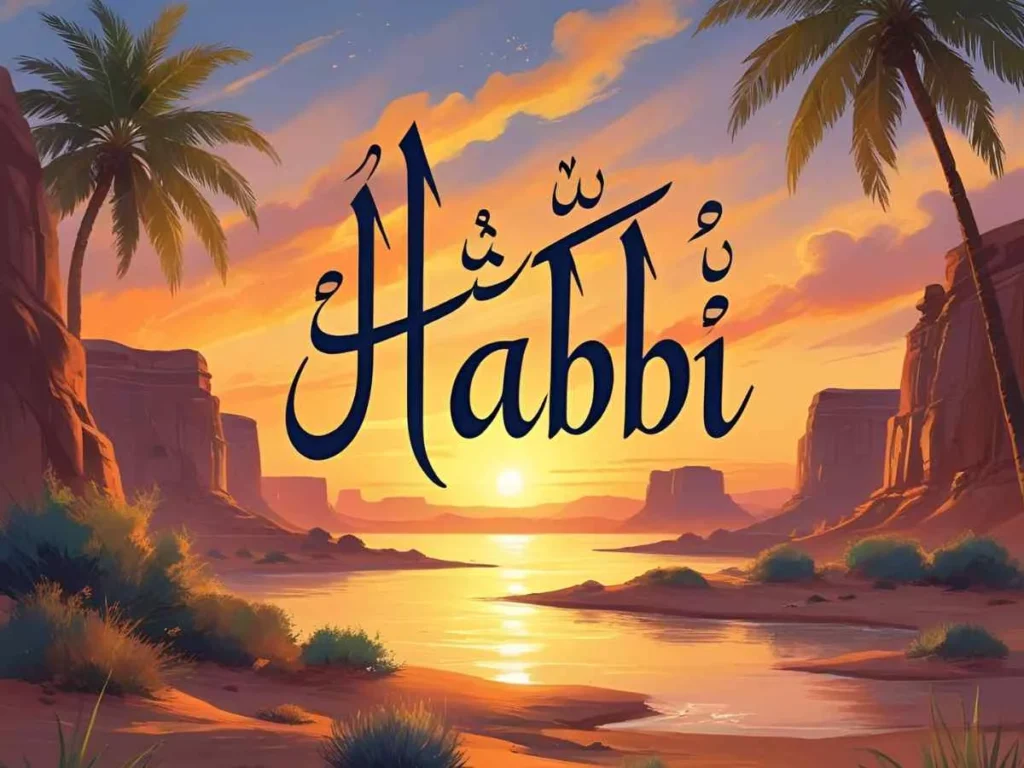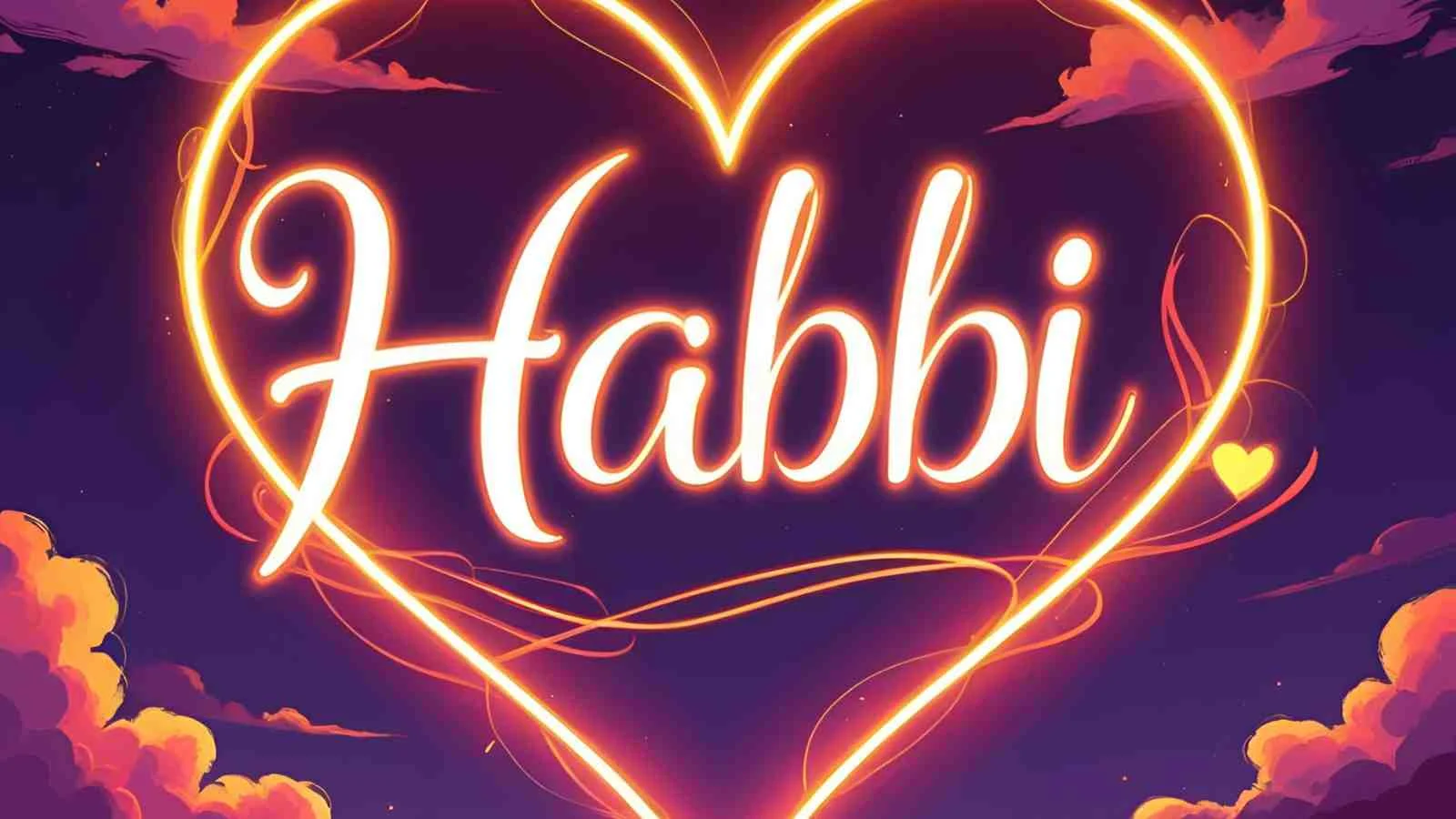The term habibi meaning has captured the curiosity of people worldwide, appearing in chats, social media, music, and movies.
Originally from Arabic, it is commonly used to express affection, love, or endearment, but its versatility goes far beyond romance.
Whether you are asking habibi meaning in Arabic, habibi meaning in English, or exploring variations like yalla habibi meaning or wallah habibi meaning, understanding its proper context can prevent misunderstandings.
From casual chats on WhatsApp, Instagram, or TikTok to cultural and religious references, the word carries rich significance. This article explores the habibi meaning in various contexts, its use in online conversations, cultural nuances, similar terms, and practical tips for using it correctly.
Meaning & Definition

The primary habibi meaning is “my beloved” or “my dear” in English. In Arabic, it is written as حبيبي (masculine) and حبيبتي (feminine).
When someone says habibi meaning to a girl, they usually use the feminine form habibti, which conveys affection and closeness. Other related expressions include my habibi meaning, which emphasizes a personal, intimate connection.
The word is often used to express warmth, friendship, love, or endearment. Variations like yalla habibi meaning in English translate to “let’s go, my dear,” commonly used in friendly or casual invitations. Similarly, al habibi meaning can emphasize familiarity or respect depending on the context.
Background
Habibi meaning in Arabic is deeply rooted in Middle Eastern culture, where terms of endearment are essential for social interactions. The word’s origin is Arabic, but it has crossed linguistic and cultural boundaries due to music, films, and global social media trends. In Islam, the term is also frequently used in friendly or affectionate greetings, giving rise to phrases like habibi meaning in Islam. Historical literature and poetry often feature the word, symbolizing loyalty, love, and friendship.
Usage in Different Contexts
Habibi is versatile and appears in multiple settings:
- Chat & Social Media: Commonly used on WhatsApp, Instagram, TikTok, or other messaging platforms to greet or express affection. Variations like assalamualaikum habibi meaning are often used as a friendly or polite greeting.
- Casual Conversations: Phrases like marhaba habibi meaning (“hello my dear”) or yalla habibi meaning (“let’s go, my dear”) add warmth to everyday interactions.
- Religious/Cultural Contexts: Terms like inshallah habibi meaning or shukran habibi meaning are used to express hope, gratitude, or good wishes.
- Slang & Modern Usage: In informal settings, habibi meaning slang captures casual, playful, or flirtatious tones.
Habibi Meaning in Chat, WhatsApp, Instagram, TikTok

In online chats, habibi is highly popular. A message like “Hey ya habibi!” can indicate friendliness, flirtation, or emotional closeness.
Emojis often accompany the term to enhance the tone. TikTok videos, Instagram captions, and WhatsApp messages frequently include yalla habibi meaning to express encouragement or invitation. Knowing the context—romantic, friendly, or playful—is essential to respond appropriately.
Habibi Meaning in Other Fields

While habibi is primarily a cultural and linguistic term, it does not have official technical meanings in fields like physics, medicine, or aviation. However, its popularity has made it recognizable worldwide. Terms like hamood habibi meaning may appear in songs, memes, or pop culture but are context-specific and playful rather than formal or technical.
Common Misconceptions
Many believe habibi is exclusively romantic. While it is often used in love songs or messages, it can also indicate friendship, familial love, or casual endearment. Another misconception is assuming it is slang or inappropriate; in Arabic culture, it is polite and widely accepted in various social contexts. Misunderstanding phrases like wallah habibi meaning (“I swear, my dear”) or assalamualaikum habibi meaning can lead to incorrect usage.
Similar Terms & Alternatives
Similar Arabic terms include:
- Habibti – Feminine form, meaning “my beloved” (for females)
- Azizi – “My dear” or “my precious”
- Qalbi – “My heart,” often used romantically
- Rafiqi – “My friend,” friendly alternative
These alternatives help you vary your language while maintaining the affectionate tone.
Habibi How to Respond to It

Responding depends on context:
- Friendly: “Hey!” or “Hi, habibi!”
- Romantic: “Habibi!” with heart emojis
- Playful/Flirtatious: Match tone with “ya habibi 😉”
- Formal/Respectful: Use in greeting phrases like assalamualaikum habibi or marhaba habibi
Being aware of context ensures respectful and meaningful interaction.
Differences from Similar Words
Unlike generic English words like “friend” or “buddy,” habibi conveys emotional closeness and cultural depth. Terms like my habibi meaning show intimacy, whereas generic alternatives lack the emotional nuance. Understanding subtle differences between habibi meaning in Arabic, habibti, and phrases like al habibi meaning allows accurate and culturally respectful use.
Relevance in Online Conversations & Dating Apps
Habibi is frequently used in dating apps, chats, and social media messages to add warmth or charm. Whether you encounter yalla habibi meaning, shukran habibi meaning, or playful uses like wallah habibi meaning in Arabic, knowing its meaning strengthens digital communication. Correct usage can make messages more appealing, culturally aware, and emotionally expressive.
Conclusion
Understanding habibi meaning is more than knowing a translation—it involves appreciating cultural, emotional, and contextual nuances. From habibi meaning in English to habibi meaning in Hindi, and phrases like inshallah habibi meaning or assalamualaikum habibi meaning, this term enriches communication. Its versatility in chats, social media, dating apps, and cultural settings makes it globally recognizable. By learning how to use habibi and its variations appropriately, you can express affection, strengthen connections, and engage confidently in diverse social and digital environments.
FAQ:
1. What does habibi mean?
Habibi means “my beloved” or “my dear” in Arabic. It is a term of affection used for friends, family, or romantic partners.
2. What is the habibi meaning in Arabic?
In Arabic, habibi (حبيبي) is the masculine form meaning “my beloved,” while habibti (حبيبتي) is the feminine form.
3. What is the habibi meaning in English?
In English, habibi translates to “my darling,” “my dear,” or “my love,” depending on the context.
4. What does yalla habibi mean?
Yalla habibi means “let’s go, my dear” or “come on, my beloved” in Arabic. It is often used casually or playfully.
5. What is the habibi meaning to a girl?
When addressing a girl, the feminine form habibti is used. It shows affection, endearment, or love.
6. What does wallah habibi mean?
Wallah habibi translates to “I swear, my dear” in Arabic. It emphasizes sincerity or seriousness in the statement.
7. What does ya habibi mean?
Ya habibi is an affectionate phrase meaning “oh my beloved” or “my dear,” commonly used in conversation or songs.
8. What does shukran habibi mean?
Shukran habibi means “thank you, my dear” in Arabic, combining gratitude with affection.
9. What is the habibi meaning in Islam?
In Islamic culture, habibi is often used as a respectful and affectionate greeting among friends and family, reflecting warmth and care.
10. What does hamood habibi mean?
Hamood habibi is a playful or informal expression, often seen in social media, songs, or memes, addressing someone affectionately.
11. Is habibi slang?
Habibi can be used informally or as slang in casual chats, but it is also a legitimate term of endearment in Arabic culture.
12. What does my habibi mean?
“My habibi” emphasizes a personal connection, translating to “my beloved” or “my dear” with an intimate tone.
13. What does al habibi mean?
Al habibi can mean “the beloved” or be used to refer to someone with respect and affection, depending on context.
14. What does marhaba habibi mean?
Marhaba habibi means “hello, my dear” in Arabic, used as a friendly greeting.
15. What does inshallah habibi mean?
Inshallah habibi means “God willing, my dear,” often used to express hope or wish for the future.
16. What does assalamualaikum habibi mean?
Assalamualaikum habibi is a greeting combining “peace be upon you” with affection, translating to “peace be upon you, my dear.”

Mariah Cannon is the creative mind behind Pikuplab.com, crafting engaging, high-ranking content with expertise and precision.
With a talent for turning ideas into impactful words, Mariah brings value to every article.

